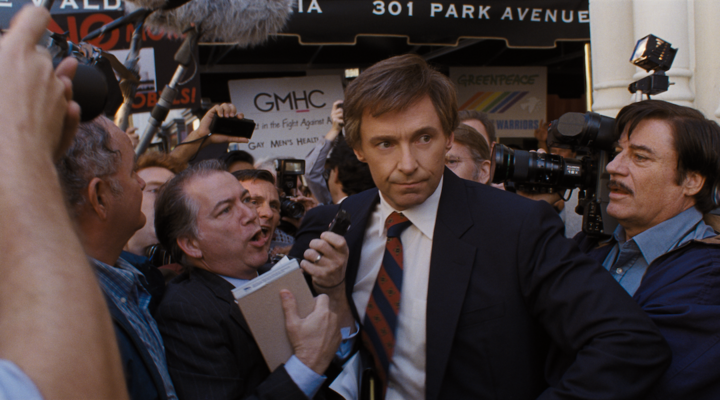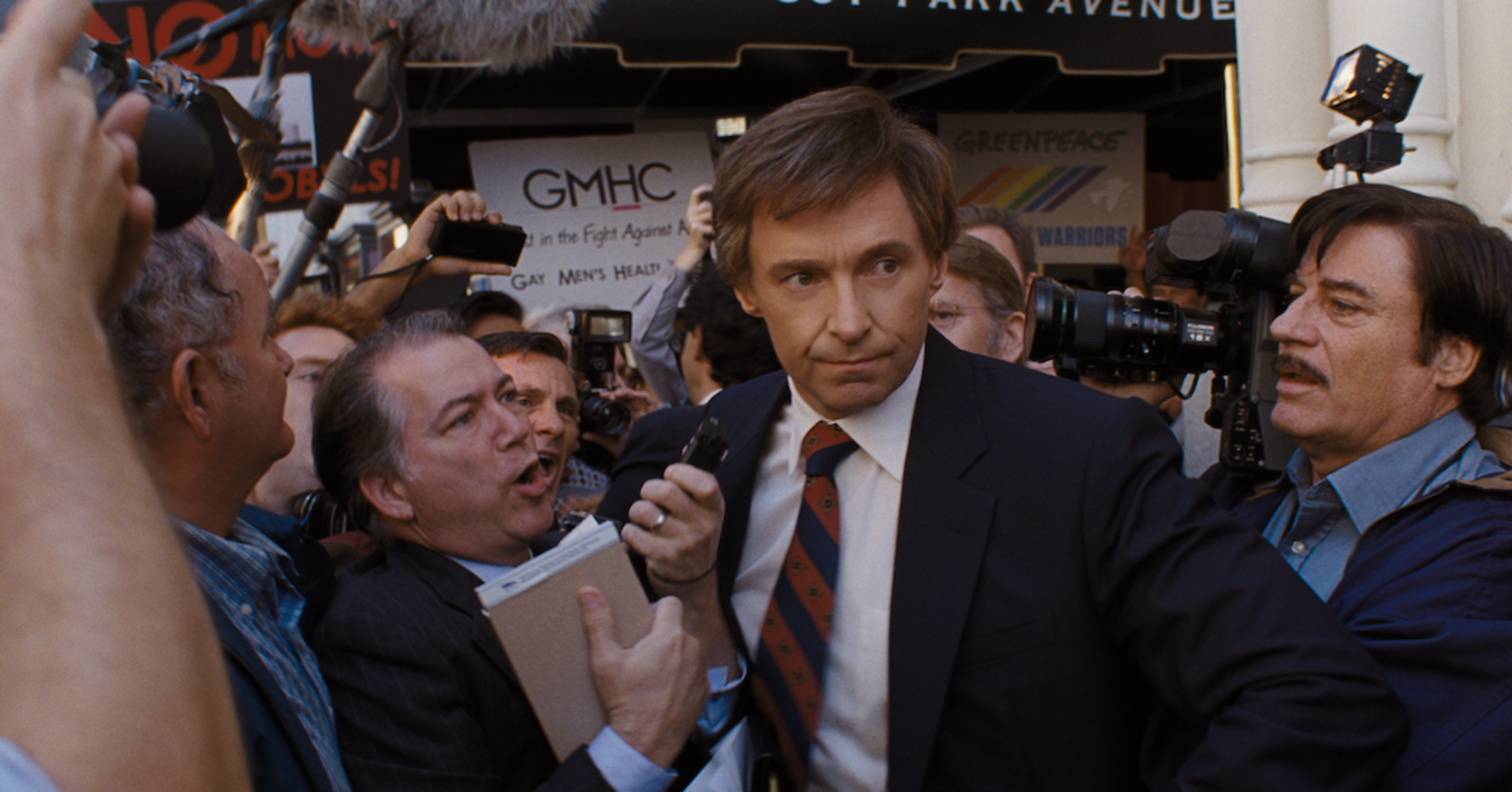[ad_1]
The idea that an extramarital affair could not only upend but swiftly topple a politician’s entire career seems so obviously quaint in 2018.
Nevertheless, that scenario is revisited in “The Front Runner,” writer-director Jason Reitman’s film on the ill-fated campaign of 1988 Democratic presidential front-runner Gary Hart (played by Hugh Jackman), opening Tuesday.
Based on Yahoo! News columnist Matt Bai’s 2014 book, the movie recounts how the married Hart’s affair with a young woman, Donna Rice, became the overwhelming focus of campaign coverage at the time, marking ― according to Bai ― a converging point for political journalism and tabloid fodder.
Hart’s downfall, we’re meant to believe, is a push-pin worthy moment on the timeline of “How the hell did we get here?” Here being whatever political funhouse surrounds us now. In our case: Donald Trump’s America, where affairs and personal scandals often dominate news coverage of him but nary affect the man’s clutch on power.
“The Front Runner” kicks off in the spring of 1987, when the then-Colorado senator was leading in early presidential polls as an above-the-fray candidate focused on “a campaign of ideas.” Frenzied shots and cuts mirror the frenetic pace of the race and establish the movie’s varying points of view: Hart, his family, his campaign staff and the reporters following every twist and turn.
The film picks up momentum when tabloid photographers catch Hart on a yacht with Miami actress and model Rice (Sara Paxton). The two begin an affair, only to soon find themselves dogged by a team of Miami Herald reporters. The journalists received an anonymous tip that led them to confront Hart in an alleyway adjacent to his Washington home, where Rice was visiting for the weekend.
The story of the affair breaks, sending the campaign into free fall. Spoiler alert: Hart eventually backs out of the race.

Sony Pictures
“The Front Runner” is not a biopic. Instead, the film focuses on the weeks between the scandal going public and Hart’s withdrawal from the race, following the various people in the senator’s orbit ― mostly his campaign staff, led by Reitman regular J.K. Simmons as campaign manager Bill Dixon, who is trying to stem the fallout from Hart’s affair and head off the Miami Herald and Washington Post reporters chasing the story.
After a screening of the movie in Washington, Reitman and the movie’s co-writers Bai and Jay Carson spoke about the push and pull between the campaign and the media depicted in their film, which they say never quite lands on one side or the other. The filmmakers claim they aren’t rooting for anyone.
“It’s really a movie without good guys or bad guys — as you would say, no white hats or black hats,” Reitman said. “Just people trying to do their jobs and trying to do the right thing, as the world suddenly gets very confusing.”
However, Reitman’s film ultimately does take a sympathetic view of Hart, portraying him as the victim of a frenzied media. He and his campaign staff decry contemporary political coverage as “tabloid bullshit.”
“What they’re going to write should never be written,” Jackman-as-Hart warns his wife, Lee (Vera Farmiga), the night before the scandal goes public.
Once the campaign unravels, the still idealistic Hart clashes with the more pragmatic Dixon. The former remains reluctant to address the growing scandal, which he sees as a personal issue irrelevant to his presidential bid, but the latter realizes the genie is out of the bottle, and there’s no turning back.
“I care about the sanctity of this process, whether you do or do not!” Hart says, his voice thundering, a scene that feels out of place against Jackman’s otherwise restrained performance.
As the movie on the whole devolves into a polemic, at times squarely an indictment of the media, “The Front Runner” brings to mind two other films that predate the Hart scandal and tread on similar territory with much more concision: 1972′s “The Candidate,” featuring Robert Redford as an idealistic political neophyte jaded by a system favoring soundbites over policy discussions (which Reitman cited as a “North Star” for his movie), and “Broadcast News.”
The characters in “Broadcast News” ― released in 1987, a few months after Hart’s downfall ― wrestle with the trend toward prioritizing style over substance. Early in the movie, brilliant workaholic producer Jane Craig (Holly Hunter) is addressing a conference of broadcast journalists, warning them of the growing influence of entertainment coverage on TV news practices. On one recent occasion, she explains, every major news network aired a clip of euphoric children at an international dominoes competition, instead of covering that day’s major international policy issue.
“I know it’s good film. I know it’s fun. I like fun. It’s just not news,” she tells the attendees. Only proving her point, she has completely lost her audience. By the end of her spiel, their eyes are glued to the clip of cascading dominoes behind her.
Later on, her best friend/co-worker/will-they-won’t-they love interest Aaron Altman (Albert Brooks) confronts Jane about her budding relationship with another colleague, Tom Grunik (William Hurt). Aaron and Tom embody the two sides of her debate. Aaron is a meticulous, gifted reporter; Tom is a charismatic presence on camera who self-admittedly doesn’t understand the news that he’s reading. Tom, Aaron argues, is a threat to the work of serious journalists ― a harbinger of journalism’s descent into mediocrity and vanity.
“He’ll just, bit by little bit, lower our standards where they’re important,” Aaron tells Jane. “Just a tiny little bit. Just coax along, flash over substance. Just a tiny little bit. And he will talk about all of us really being salesmen.”
“The Front Runner” is no “Broadcast News.” It fails in its intention to reveal the bigger picture behind Hart’s downfall, to connect his past with our present. Its characters stand in for moral arguments rather than effectively act them out. Leaving the theater, you’re no closer to answering the question of “How the hell did we get here?” than you were when you entered.
But Reitman’s bird’s-eye-view technique hints at what could have been. Some of the film’s best and most trenchant moments, particularly involving the women in the story, open up threads about the ideas of victimhood and how men control our political narratives.
The film confidently explores how Rice was reduced to a punchline, like so many women at the center of political scandals who are given no agency, their identities all but erased. When Rice’s identity becomes synonymous with the scandal, when she is written off by the public as a dumb slut and forced into hiding, the film makes clear that, unlike Hart, she has no entourage of handlers to protect her. One female staffer tasked with looking after Rice, a composite character named Irene Kelly (Molly Ephraim), becomes disillusioned with the campaign as a result.
“This is never going to be over for her, every time she applies for a job,” Kelly says of Rice.
A more compelling movie could have been built more around the characters of Rice and Kelly, or Washington Post editor Ann Devroy (Ari Graynor). In Reitman’s story, Devroy’s male colleague (Mamoudou Athie as reporter A.J. Parker, another composite character) questions whether the outlet is sensationalizing a politician’s personal life for the sake of selling papers. Devroy argues against him, claiming that the story matters.
“He’s a man with power and opportunity, and that takes a certain responsibility,” she says of Hart, a reminder that’s far from quaint in our Me Too era.
Like its characters’ blow-out hair and brick-sized cell phones, the movie at large plays out like a relic of times past. Yet its Election Day release date suggests that the studio believes the story upon which “The Front Runner” is based is timely, and the team behind the movie seems to think that too.
“The system has changed a lot,” Carson conceded, but “it’s not necessarily that this [story] is quaint. We’re just in a moment where we watched the beginning of the change.”
“The Front Runner” opens in theaters Tuesday, Nov. 6.
[ad_2]
Source link

